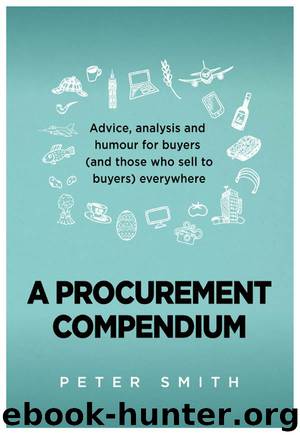A Procurement Compendium by Peter Smith

Author:Peter Smith
Language: eng
Format: epub
Publisher: Brown Dog Books
Chapter 5
ADVICE AND GOOD PRACTICE
Here is a selection of the advice that I’ve offered over the years, all of it gratefully received and implemented by the procurement profession … or maybe not! We’ll start with the work of Nobel Prize-winner Daniel Kahneman and how behavioural psychology plays into negotiation theory and practice.
Thinking (about Procurement) Fast and Slow with Daniel Kahneman
Procurement is a relatively non-academic and unscientific ‘profession’.
It lacks the regulatory basis of accounting, or a body of knowledge that is clearly laid out, agreed and codified as the correct way of doing things. It lacks the direct measurement of sales and marketing; we may not consider these business functions are particularly scientific, but actually they provide their disciples with direct ways of measuring the benefits of what they so, through metrics such as market share, customer awareness or simply sales figures.
The tangible nature of those results means that classical scientific experimentation is at least possible in these areas. The Brand Manager can try controlled alternative approaches and actually measure which one works best.
Procurement has very little in the way of scientifically proven best practice, and not really very much even in terms of academic underpinning to what we do day-to-day. That is in part because many key procurement activities appear highly subjective and are linked to behavioural skills and issues, which are harder to analyse and study than fact-based actions. Such ‘soft’ activities include negotiation, relationship management, even, arguably, risk management.
However, a very interesting addition to the ‘scientific’ basis for what we do has come from an unlikely quarter. Daniel Kahneman is a psychologist by training but won the Nobel Prize in Economics in 2002. He won that for showing that one of the foundations on which classical economics was built is faulty. That is the assumption that people behave as rational beings when it comes to economic behaviour and decisions. He and his collaborators proved that this is far from the case, which punched holes in much economic thinking and many existing theories.
But his work has far wider ramifications than ‘just’ classical economic theory. His book, Thinking, Fast and Slow, brings together his life’s work in a highly readable (but not dumbed down) manner, and aims to explain, basically, how we think. It is brilliant, and I cannot recommend it highly enough.
At the heart of it is Kahneman’s concept of System 1 and System 2 thinking. System 1 is the easy, automatic, intuitive, rapid thinking that gets us through most of life. Driving to work without thinking about the route. Answering most emails. Skim-reading documents. Recognising our families and close friends.
System 2 is the ‘hard’, out of our comfort zone, thinking. Answering difficult maths questions, responding to a tricky interview question, thinking hard about future procurement strategies perhaps.
So, one of his hypotheses, pretty well proven, is that we will do pretty much anything we can to avoid System 2 thinking, because it is difficult, uses more energy, and stops us multitasking. This goes right back to evolutionary thinking –
Download
This site does not store any files on its server. We only index and link to content provided by other sites. Please contact the content providers to delete copyright contents if any and email us, we'll remove relevant links or contents immediately.
Hit Refresh by Satya Nadella(9085)
The Compound Effect by Darren Hardy(8876)
Change Your Questions, Change Your Life by Marilee Adams(7692)
Nudge - Improving Decisions about Health, Wealth, and Happiness by Thaler Sunstein(7662)
The Black Swan by Nassim Nicholas Taleb(7064)
Deep Work by Cal Newport(6970)
Rich Dad Poor Dad by Robert T. Kiyosaki(6519)
Daring Greatly by Brene Brown(6477)
Principles: Life and Work by Ray Dalio(6301)
Playing to Win_ How Strategy Really Works by A.G. Lafley & Roger L. Martin(6096)
Man-made Catastrophes and Risk Information Concealment by Dmitry Chernov & Didier Sornette(5958)
Digital Minimalism by Cal Newport;(5712)
Big Magic: Creative Living Beyond Fear by Elizabeth Gilbert(5682)
The Myth of the Strong Leader by Archie Brown(5463)
The Slight Edge by Jeff Olson(5383)
Discipline Equals Freedom by Jocko Willink(5337)
The Motivation Myth by Jeff Haden(5176)
The Laws of Human Nature by Robert Greene(5090)
Stone's Rules by Roger Stone(5055)
